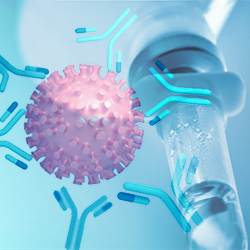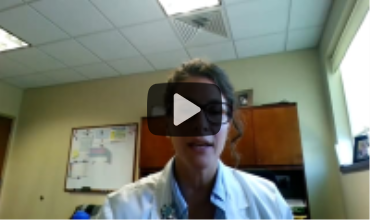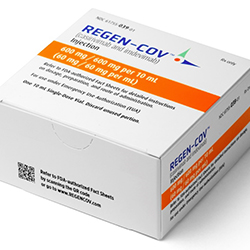By IDSE News Staff
A new analysis showed casirivimab-imdevimab (CAS/IMD; Regen-Cov, Regeneron) reduced the risk for con-tracting COVID-19 by 81.6% for up to eight months, maintaining the 81.4% risk reduction during the first month after administration.
“Today’s new data demonstrate how a single dose of Regen-Cov can help protect people from COVID-19 for many months after administration,” said Myron S. Cohen, MD, who leads the monoclonal antibody efforts for the National Institutes of Health–sponsored COVID Prevention Network and is the director of the Institute for Global Health and Infectious Diseases at the University of North Carolina at Chapel Hill. “These results demonstrate that Regen-Cov has the potential to provide long-lasting immunity from SARS-CoV-2 infection, a result particularly important to those who do not respond to COVID-19 vaccines, including people who are immunocompromised.”
Regeneron’s VelocImmune technology uses a proprietary genetically engineered mouse platform endowed with a genetically humanized immune system to produce optimized fully human antibodies to develop CAS/IMD.
The phase 3, double-blind, placebo-controlled trial enrolled people who lived in the same household as a person who was diagnosed with SARS-CoV-2 within the prior four days. All participants were tested for SARS-CoV-2 at baseline by real-time polymerase chain reaction assay from nasopharyngeal swabs and for the pres-ence of antibodies using serum antibody testing. Participants were randomized to receive either one dose of CAS/IMD (1,200 mg) or placebo, administered by four subcutaneous injections.
During the trial, participants were tested weekly for SARS-CoV-2 for four weeks, as part of the primary analyses. Following this, participants were to be tested if they developed any COVID-19 symptoms from weeks 5 to 32.
The new analyses include results from 1,683 people who were not infected with SARS-CoV-2 and were seronegative at baseline. Across both groups, approximately 95% completed the trial. In total, 42% identified as Hispanic and 9% as Black. In addition, 34% were obese and 37% were 50 years of age or older (median age, 43 years; range, 12-92 years).
In results previously published, the trial met its primary end point, reducing the risk for COVID-19 by 81.4% within one month of receiving CAS/IMD (P<0.0001). The new results described a prespecified analy-sis for the following seven months, throughout which an additional 45 symptomatic infections occurred. Dur-ing this period, the antibody cocktail continued to prevent infection, without requiring additional doses. Compared with placebo (n=842), people who received a single dose of CAS/IMD (n=841) experienced:
- 81.6% reduced risk of developing COVID-19 during the prespecified follow-up period, between months 2 and 8 (seven CAS/IMD, 38 placebo; 95% CI, 59.8%-91.6%; nominal P<0.0001); and
- 81.5% reduced risk for developing COVID-19 at any time during the eight months after receiving CAS/IMD (20 CAS/IMD, 108 placebo; 95% CI, 70.6%-88.4%; nominal P<0.0001).
During the eight-month assessment period, no one in the CAS/IMD group was hospitalized due to COVID-19, compared with six people in the placebo group (one person in the first month; five people during months 2-8). There were no deaths due to COVID-19 in any treatment group during the eight-month assessment period, and there were no new safety signals identified with CAS/IMD.
The trial, which was fully enrolled in early 2021, allowed participants to become vaccinated if they wished after the first month. Vaccination rates during the assessment period of months 2 to 8 were balanced, with 34.5% (n=290) of the CAS/IMD group and 35.2% (n=296) of the placebo group receiving at least one COVID-19 vaccine dose by the end of the eight-month assessment period.
Through an innovative trial design, researchers demonstrated the impact of CAS/IMD in high-risk house-hold transmission settings (month 1, both pre- and post-exposure prophylaxis), as well as after the immedi-ate risk for household infection had subsided (months 2-8, pre-exposure prophylaxis), when most infections were presumably acquired in the broader community.
During the initial high-risk period related to household transmission, the rate of COVID-19 was 13-fold higher among those who did not receive CAS/IMD than during the subsequent period of ongoing transmis-sion: during month one, the rate of COVID-19 in the placebo group was 8.3% per month; and during months two to eight it decreased to 0.6% per month on average.
CAS/IMD is authorized in the United States to treat people who are at high risk for serious consequences from COVID-19 infection who are either already infected but not hospitalized or in certain post-exposure prophylaxis settings. It is not indicated as a replacement for vaccination.




